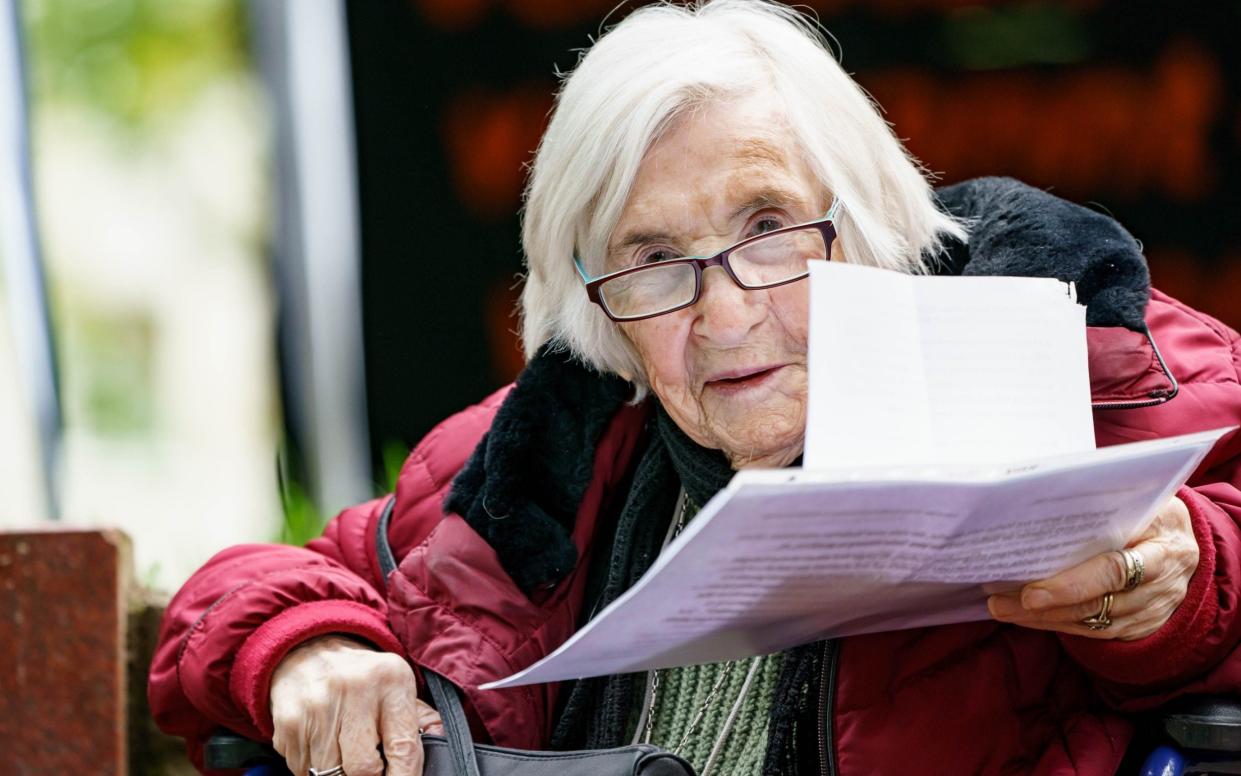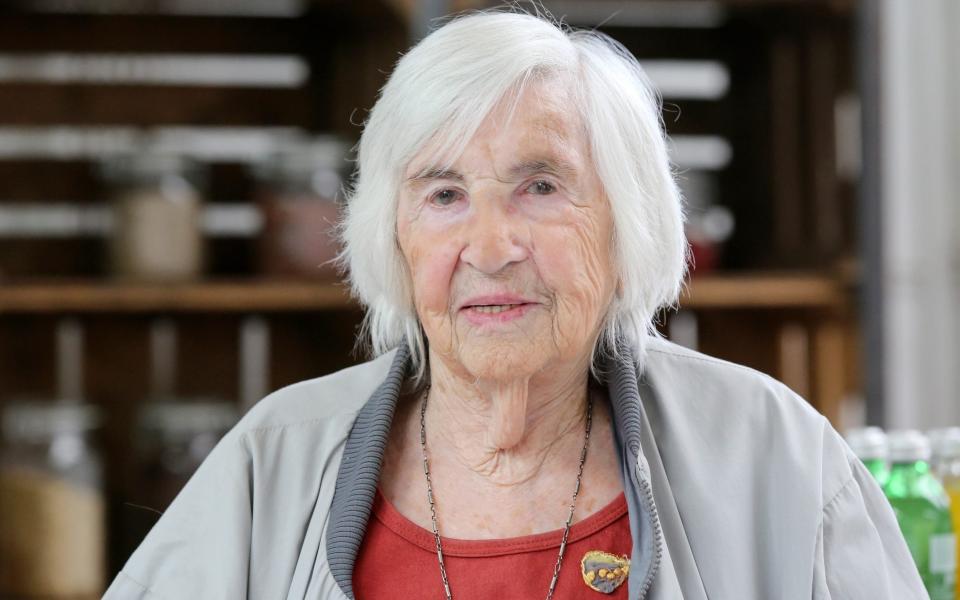Esther Bejarano, one of the last survivors of the Auschwitz women’s orchestra, who later used music to educate German youth – obituary

- Oops!Something went wrong.Please try again later.
Esther Bejarano, who has died in Hamburg aged 96, was a Jewish survivor of the Holocaust and, later in her life, a campaigner against anti-Semitism and racism.
After the Kristallnacht pogrom against the Jews in Germany in November 1938, Esther Bejarano’s parents decided to send her to a Zionist training centre in preparation for emigration to Palestine. But in 1941, German police arrested all the teachers and students in the Zionist camp, sending them to the Nazi Landwerk Neuendorf forced labour camp, not far from Berlin.
From there, Esther Bejarano was deported to Auschwitz-Birkenau, the death camp in German-occupied Poland, where she arrived on April 20 1943, after an exhausting five-day journey in a cattle car.
On her arrival, along with the other prisoners, she was greeted by a German officer saying: “Now, you filthy Jews, we will show you what it means to work”, and she was forced into hard labour, gathering and carrying heavy rocks.
Around the time of her arrival in Auschwitz, Esther Bejarano learnt that musicians were needed for the newly established Mädchenorchester von Auschwitz, the women’s orchestra of Auschwitz.
“I introduced myself to the organiser and said that I could play the piano [but she told me that] ‘we don’t have a piano here’,” Esther Bejarano recalled in a later interview. It was then suggested that, if she could play the accordion she would be invited to an audition.
Regarding the accordion keyboard to be the same as the piano’s, Esther Bejarano, who had never played the accordion before, said that she could play the instrument: “I was instructed to play a well-known German song, I knew the song … it was like a miracle … I played the song … I was accepted.” The song was Du hast Glück bei den Frau’n.
The role of the orchestra was to perform, particularly, when trains arrived with Jews on board. “You knew that [the new arrivals] were going to be gassed,” she said, “and all you could do was stand there and play … we played with tears in our eyes … the new arrivals came in waving and applauding us, but we knew they would be taken directly to the gas chambers.”
When Esther Bejarano was in Auschwitz, the International Red Cross searched for mischling (mixed race) prisoners – to save them, since according to Nazi laws a person of mixed Jewish-Aryan ancestry should not be deported to extermination camps.
As Esther Bejarano had a Christian paternal grandmother, her friends at the camp convinced her to report to the Red Cross as a mischling, so that she could get out of Auschwitz and “tell people what we’ve been through in the camp”.
In September 1943, she was transferred to the Ravensbrück women’s concentration camp in northern Germany.
In April 1945 Esther Bejarano managed to flee while being taken on a death march, a forced evacuation of prisoners towards the west as Soviet troops closed in. A few weeks later, she played her accordion, surrounded by Allied troops, as a picture of Adolf Hitler was consumed on a bonfire.

She was born Esther Loewy in Saarlouis, Saar Territory (then French-controlled Germany), on December 15 1924, one of five children of Rudolf, a teacher, and Margarethe Loewy. Young Esther grew up in a musical house where her father – a cantor in the Jewish community of Saarlouis – encouraged her to learn music and play the piano, in which she excelled.
By early 1935 the French-administered Saar Territory was returned to Germany as a result of a referendum administered by the League of Nations and, gradually, the Loewys became second-class citizens, stripped of their civil liberties.
In November 1938 the local synagogue was destroyed, and young Esther could no longer go to school. Like other Jews, the Loewys had to wear the Star of David. Later, she would say of this period: “One’s best years as a youth are those between 16 and 20. But what kind of a youth did we have? None, really. A horrible youth.”
In November 1941 Esther’s parents were shot, after having been deported to the Kaiserwald concentration camp near Riga (now in Latvia). One of her sisters, Ruth, was able to find shelter in Switzerland, but Swiss immigration police eventually deported her back to Germany, where she would die in Auschwitz on December 1 1942.
“This is so fateful,” Esther Bejarano said later. “I came to Auschwitz in April 1943 and if she had lived, I would have met her there.”
After the war, Esther Bejarano emigrated to Palestine, then under British Mandate, arriving there with a group of Jewish refugees by boat from Marseille. She studied singing in Tel Aviv and, as she was so good at it, she toured Israel and even travelled abroad as a singer.
In 1960, finding life in Israel difficult, she emigrated with her husband and children to Germany and settled in Hamburg.
At first, she struggled to integrate into German life. Post-war Germany had few Jews, and many Germans of the older generation wanted to leave the past behind and start a new chapter. “When I saw people who looked a bit older than me”, she recalled in an interview, “I always wondered whether they had perhaps been the murderers of my parents and my sister.”
Esther Bejarano fought the demons of her past with music; with her children, Edna and Yoram, she set up a band to play Yiddish melodies, and, later, she sang with the hip-hop band Microphone Mafia, which used music to spread an message of anti-racism to German youth. “We all love music and share a common goal: we’re fighting against racism and discrimination,” she would often tell her audience.
In recent years, her voice had weakened, and she would agree for Microphone Mafia to play her songs as recordings during concerts.
She was the co-founder and chairman of the International Auschwitz Committee and a founding member of the Association of Persecutees of the Nazi Regime.
Esther Bejarano was awarded the Carl von Ossietzky medal and Germany’s Order of Merit for her fight against racism and discrimination.
She was a popular public speaker and would often visit schools to talk to German schoolchildren about her Holocaust experiences.
A tiny woman, not even 5 ft tall, she was full of energy and spirit.
Esther Bejarano and her husband, Nissim, had two children.
Esther Bejarano, born December 15 1924, died July 10 2021

